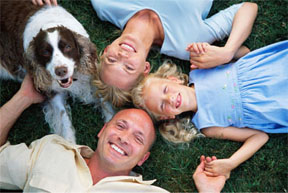A recent study among college students looked at their relationships with various significant others, including their dads … and their dogs.
Several years ago, Dr. Larry Kurdek from Wright State University found that his two dogs were important sources of comfort during his own battle with colon cancer. In this study, he compared attachments to pet dogs with attachments in human relationships.
In nearly all areas of attachment—such as being a dependable source of comfort, being sought out for reassurance, and being missed when separated—the students rated their fathers higher than their dogs, with one notable exception: In “proximity maintenance”—enjoying having someone nearby and accessible—the dogs were preferred. Also, a smaller group of students who were identified as “dog lovers” reported feeling closer to their dogs than to their fathers in an overall measure of attachment.
 Admittedly, this study has some limitations, and we can’t draw any sweeping conclusions from it. But Dr. Kurdek’s conclusion about fathers should be a challenge to us. He writes that perhaps dogs are more “uncritical and unconditional providers of acceptance and affection” than fathers.
Admittedly, this study has some limitations, and we can’t draw any sweeping conclusions from it. But Dr. Kurdek’s conclusion about fathers should be a challenge to us. He writes that perhaps dogs are more “uncritical and unconditional providers of acceptance and affection” than fathers.
Would your child say that he enjoys being around you? Or does he feel pressure to behave a certain way? Are things tense when you’re together? Do you find yourself looking for and pointing out negatives?
Maybe it’s time we start showing our love and acceptance a little more like (if you’ll pardon the expression) a faithful pooch. Our love should be unconditional; we should be thrilled just to see our children when they walk in the door; they shouldn’t have to prove anything; we should love them whether they do great things or not, whether they are compliant or strong-willed, or even if they go off the deep end in some way. We should love them simply because they’re our kids.
ACTION POINTS
- Have you ever told your children how much you love them—and that your love won’t change no matter what they do? If not, try it.
- Learn the love languages of each of your children so you can be sure your loving words and actions are having their full impact.
- Talk to your children about how the family pet “relates” to family members, pointing out positive and negative things they can learn from.

